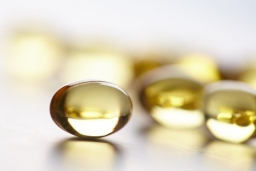Can Omega-3 Fatty Acid Supplementation Improve Athletic Performance?
Wednesday, July 19, 2017 - 09:11

Omega-3 fatty acids are associated with various health benefits, affecting heart and brain health, learning, and cholesterol levels. Its anti-inflammatory properties have led researchers to explore how omega-3 supplementation could mediate the effects of exercise-induced muscle damage. What implications does omega-3 fatty acid supplementation have for athletes and their performance?
Exercise-induced muscle damage (EIMD) often occurs after engaging in eccentric exercise or in exercise we are not used to. What we may notice the most is how sore our muscles feel 24-72 hours after the workout. There are usually also localized inflammation and decrements in the strength and function of those muscles. For athletes preparing for or participating in competition, recovery is of utmost importance in order to get back to peak performance.
Fish oil and krill oil are a popular sources of omega-3 fatty acids, specifically eicosapentaenoic acid (EPA) and docosahexaenoic acid (DHA). Already popular as an anti-inflammatory, researchers are examining the use of omega-3s in an athletic context; EPA in particular is connected to an improved inflammatory response to EIMD.
Many studies show that consuming omega-3 fatty acids with a high EPA to DHA ratio has positive consequences for subjects participating in high-intensity and/or eccentric exercise. The exact impact, however, differs depending on the timeframe of supplementation:
Participants consumed either an EPA and DHA supplementation or a placebo for eight weeks, then completed eccentric elbow flexion exercises.
- There were no differences in muscle swelling, soreness, exercise performance completed between groups.
- The omega-3 supplemented group had significantly better range of motion in elbow flexion immediately after the exercise up until three days later.
Chronic consumption leads to the incorporation of omega-3 fatty acids into the muscle cell membrane, changing its permeability and offering a degree of protection from EIMD.
Participants ate an omega-3-restricted diet for 14 days before performing eccentric bicep curls. They then consumed omega-3s for seven days and performed the same exercise.
- There was no difference in swelling 48 hours after the exercise when comparing the control trial and the omega-3 trial.
- Localized soreness, when measured 48 hours after the exercise, was significantly reduced after seven days of omega-3 supplementation.
Participants ingested either a low-EPA fish oil, a high-EPA fish oil, or a placebo supplement immediately after completing squat jumps and strength tests.
- There was no difference in swelling or muscle soreness between the three groups.
- Participants that ingested the high-EPA fish oil recovered significantly faster:
- The decrease in squat jump performance for the high-EPA group one hour after baseline testing was the same as the decrease 96 hours later for the low-EPA and placebo groups.
- 24 hours after the initial tests, the high-EPA group had returned to within ~2% of their baseline performance, while the two other groups remained ~12% lower than baseline.
Implications for Athletes and Others
- Chronic omega-3 supplementation results in changes to muscle cell membranes and could offset the effects of EIMD, including less reduction to range of motion.
- Reduced localized soreness after omega-3 supplementation for only seven days suggests that people could plan supplementation seven days ahead of an activity that may cause soreness, benefitting athletes, and patients starting physical therapy or rehab programs.
- Acute supplementation of omega-3 may promote faster recovery for subsequent performance, especially beneficial for athletes with many competitions in a short span of time, such as in a tournament.
- Omega-3 supplementation does not seem to directly improve performance, but its effect on range of motion, soreness, and recovery may help a performance in a subsequent game or exercise bout be as strong as possible.
It is important to keep in mind that these are study results and stem from a very specific and controlled set of parameters. The effect of omega-3 supplementation was different depending on the supplementation period, but may also vary depending on the dose, the type of exercise, the muscle group exercised, the time elapsed when measurements are taken, and of course, on individual differences. In all conditions, though, omega-3 supplementation had positive influences that could benefit performance. Consulting with a dietician may help you understand how to increase your dietary omega-3 and if supplementation fits into your particular lifestyle or training plan.
Sources:
Jakeman JR, Lambrick DM, Wooley B, Babraj JA, Faulkner JA. Effect of an acute dose of omega-3 fish oil following exercise-induced muscle damage. European Journal of Applied Physiology. 2017; 117(3): 575-582.
Jouris KB, McDaniel JL, Weiss EP. The effect of omega-3 fatty acid supplementation on the inflammatory response to eccentric strength exercise. Journal of Sports Science and Medicine. 2011; 10(3): 432-438.
Mercola J. Your Practical Guide to Omega-3 Benefits and Supplementation. Dr. Joseph Mercola.
Tsuchiya Y, Yanagimoto K, Nakazato K, Hayamizu K. Eicosapentaenoic and docosahexaenoic acids-rich fish oil supplementation attenuates strength loss and limited joint range of motion after eccentric contractions: a randomized, double-blind, placebo-controlled, parallel-group trial. 2016; 116(16): 1179-1188.